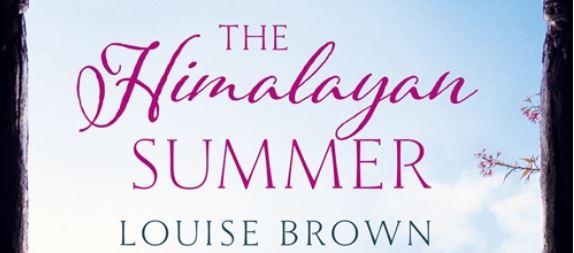An extract from Louise Brown’s The Himalayan Summer

Ellie had heard Francis’s story a dozen times during the previous month, and the tale changed slightly each time he told it. She knew some of it was true because she’d been there to witness it.
Three months ago, at the start of the hot season, they had been in Calcutta, where Francis was busy ordering guns and having hunting clothes made. Then he went to the Sundarbans to bag a Royal Bengal tiger or two, and left Ellie and the twins in a suite in the Great Eastern Hotel, with only Nanny Barker for company. It was like a prison. Outside, everything baked. The Maidan, Calcutta’s great green park, turned a crisp brown, and the city was covered in a choking layer of dust. Nanny Barker became ever more officious and Ellie was increasingly nervy. She was so miserable that she was pleased when Francis returned from the hunt, tigerless as usual. A few days later, he appeared with an ayah, a Bengali girl, whom he insisted they needed because Nanny Barker was getting old, and her puffy ankles were a sure sign she wasn’t coping with the heat. The new girl looked at Ellie without smiling.
Francis seemed happy for a week and then became irritable. ‘I need to be back on the hunt,’ he explained to Ellie. ‘You won’t understand, but there’s nothing quite like it. It’s man against beast; you pit your wits against the King of the Jungle.’
What a load of garbage, Ellie thought, totting up the carnage Francis had wreaked during his career as a sportsman: the small animals he’d maimed and slaughtered; the creatures who had crawled into the jungle to die after being wounded by her husband’s wide shots.
Francis spent every evening in the hotel bar or in one of Calcutta’s many clubs. He was invited by members who were eager to be seen with a peer of the realm, and he recounted his exploits in the Sundarbans, Kenya and South Africa to a rapt audience. Every night, he returned to the Great Eastern raging drunk, and usually in a vicious temper.
‘They’re the most bloody awful plebs,’ he said to Ellie, launching himself on to the bed after a long evening at the Tollygunge Club. ‘They’ve got the natives running after them like they’re royalty.’ He lay on his back, lit a cigarette, put one arm behind his head and blew smoke very slowly through his nostrils.
The next night he planned to go to a bar on Park Street, where, he told Ellie, he was less likely to meet offensive middleclass products of minor public schools and Oxbridge.
When he returned, he was twitchy with excitement. ‘The place was full of adventurers, explorers, hunters,’ he explained, though he couldn’t pinpoint exactly which bar he was referring to. He wasn’t specific when he told the tale to others, either. The club, he said, was packed and he was just about to order a drink when a foreigner – an enormous Dane – elbowed him and then pushed a tiny Indian man out of the way. The Indian fell, sprawling on the floor, and when Francis remonstrated, the man threatened in his thick, guttural accent to kick his head in. Francis rose to the challenge, stood his ground, ducked a few punches and then cleanly and surgically, with a single well-placed blow, knocked the brute out.
The Indian picked himself up off the floor, dusted himself down and, to Francis’s surprise, revealed he wasn’t Indian after all. He was, in fact, Nepali, the favourite nephew of Nepal’s maharaja and a great shikari himself. So, over a bottle of Scotch, the peer of the British realm and the nephew of the Maharaja became fast friends, and Francis was persuaded to visit Nepal and teach the Maharaja’s nephew all about the excellence of British sporting traditions. He was going to explain the practicalities of hunting with hounds, and the possibility of developing grouse shooting in the mountain kingdom. In return, the Maharaja’s nephew promised to take him to a camp in the Nepal Terai, where they would ride in bejewelled howdahs on the backs of giant tuskers and shoot more tigers than the old British king.
The version of the story that Francis told the planters in Darjeeling was embellished by details of the Dane’s enormous size and belligerence, the impressiveness of Francis’s own chivalry, and the fervent gratitude of the Maharaja’s nephew. The essence remained the same, however, including the outcome: in January they were going to travel to Kathmandu as guests of Maharaja Juddha Shumsher Rana, Prime Minister of Nepal, and his ill-treated nephew.
The planters were quiet, and envious.
‘You’ll have a very varied bag. I daresay you’ll have a shot at elephants and wild buffalo, even rhino,’ Johnson said.
Mrs Johnson looked at Ellie. ‘My dear, will you be staying here or in Calcutta while your husband goes on his shoot?’
‘I’m going too,’ Ellie said.
‘No,’ Mrs Johnson said, her voice rising to a hoot. ‘It’s frightfully dangerous. There’s not a single European woman in the whole country.’ She reconsidered for a moment. ‘Well, no more than a handful.’ She thought again, and looked to her husband for support. ‘I can’t imagine there’ll be a single American either,’ she added in a rush.
‘They don’t call it a closed kingdom for nothing,’ a red-skinned planter added. He’d been severely sunburned over so many decades that his face looked like a skinned tomato.
When Francis had first announced the trip, he’d insisted Ellie should return to England. ‘It will be better for the children,’ he said.
Ellie shuddered at the thought of Francis’s vast, shabby house in the bleak countryside of eastern England. Draughts blew through enormous, sparsely furnished rooms, and a chill wind whistled down the long, dark corridors, along which the lino curled up at the edges and had thinned over decades to form holes where the servants’ footfall was heaviest.
‘I’m coming with you,’ she told him.
‘You are?’ he said, both incredulous and disappointed. ‘You’ve never stayed in a forty-pound tent in the thick of the jungle, surrounded by hyenas and tigers. You’ll be bitten by mosquitoes and caked in mud. And don’t imagine we’re going to drive to Kathmandu. We can’t take a plane either. You’ll have to climb over the damned mountains to get there.’
Ellie was unwavering: she wasn’t going to leave Francis to travel the subcontinent, spending her money. She’d probably never see him again. Even more importantly, she wanted to visit Nepal because it was in the heart of the Himalayas and near to Tibet, one of the last unmapped places on the planet.
In the Planters’ Club, everyone was waiting for her to speak.
‘We’re all going,’ she told them.

Louise Brown’s THE HIMALAYAN SUMMER is out now





